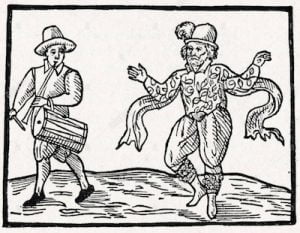The use of the name by C16th English slapstick clowns, out of fashion at home, unable to speak the languages of the countries where they laughed
PICKELHERING
A stock character of German clowning popular up until the nineteenth century, in common with contemporary clowns, Pickelhering wore oversized shoes, trousers and waistcoat and a large ruff collar. He was introduced by the troupes of English actors who were popular in Germany between 1592 and 1659.
In 1586, The Earl of Leicester had taken his own company of actors to the Low Countries, when commanding the English Army sent to support the Dutch Revolt. Encouraged by Leicester to play for King Frederick II of Denmark, Shakespeare’s large-bottomed dancer and clown Will Kemp was in the company that performed at Helsingör or Elsinore.
With herrings responsible for correctly prophesying Frederick’s death a year later, it’s good to think of him having a laugh in the new castle he’d built there.
In the 1590s a glut in the supply of actors in England led to falling wages. Several tried their hands on the continent. At the same time, Shakespeare and his contemporaries were moving away from slapstick clowning. As the man himself wrote in Hamlet:
Let those that play your clowns speak no more than is set down for them; for there be of them that will themselves laugh, to set on some quantity of barren spectators to laugh too, though in the mean time some necessary question of the play be then to be considered; that’s villainous, and shows a most pitiful ambition in the fool that uses it.
Will Kemp saw the writing on the wall and sold his shares in the Globe, embarking on the celebrated Nine Daies Wonder in which he morris danced his way from London to Norwich. Kemp’s account of the feat includes a postscript burning with resentment at his detractors and, in particular, My notable Shakerags, the author of abhominale ballets written of me.

The clowns, musicians and dancers who were now surplus to requirements in England, opened up a market in Germany. Speaking little German they presented simplified versions of plays with dumbshow explanations. German audiences loved the slapstick.
In particular they loved the clowns who entertained the crowds between the acts. Along with the obscene gestures, their pidgin English was littered with mispronounced Dutch and German words and phrases.
Me, Pickelhering, the clowns would announce. Preserved fish raised a cheap laugh in any language. Hans Stockfish was another of the popular English clown characters.
An English eyewitness at the Frankfurt Fair of August 1592 wrote:
The Germans, not vnderstanding a worde they sayde, both men and wemen, flocked wonderfully to see theire gesture and Action, rather then heare them, speaking English which they vnderstoode not, and pronowncing peeces and Patches of English playes, which my selfe and some English men there present could not heare without great wearysomenes.
